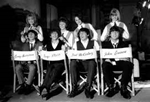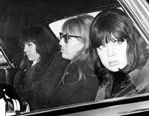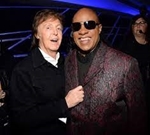- Register
- Log in to Tune-In
- Wishlist (0)
-
Shopping cart
(0)
You have no items in your shopping cart.
Beatles News

Paul McCartney revealed there’s a secret chord in The Beatles‘ “I’ll Get You.” He and John Lennon wrote the song while still living in Liverpool. The songwriting partners didn’t know many chords back then, but they had recently learned a new one when they wrote the tune.
The Beatles’ “I’ll Get You” was the B-side of their 1963 hit single, “She Loves You.” However, Paul and John wrote it years before while still living in Liverpool.
In The Lyrics: 1956 to the Present, Paul wrote that he and his songwriter partner wrote the tune at John’s house on Menlove Avenue. John’s Aunt Mimi raised him starting from when he was a toddler. She was a strict, strong-willed woman who didn’t want her nephew to waste his life on music.
According to Paul McCartney, John was “the posh one,” living in a nice neighborhood, but Mimi hated when John’s friends came over to play music. She treated them like they were the worst company in the world.
Source: Hannah Wigandt/cheatsheet.com

Sir Paul McCartney has been named as the UK's top choice to perform at King Charles' coronation.
King Charles III's coronation will take place on May 6. Reports in the past week claimed several artists had turned down the opportunity to perform at the event, including Harry Styles and Sir Elton John.
A survey by pub chain Hungry Horse asked 2,000 people for their choice on the ideal performer.
Adele, who came out as the UK’s favoured choice to perform with 16% of the vote, has also reportedly ruled out a coronation performance, meaning Sir Paul McCartney (8%) is the top artist yet to rule themselves out of the celebrations.
1980s icon Kate Bush took 8% of the vote, after her 1985 hit Running Up That Hill saw a huge resurgence throughout 2022 thanks to its use in TV series Stranger Things. Lewis Capaldi (8%), Stormzy (7%) and Tom Jones (6%) also finished within the top ten.
details
The Beatles were heavily influenced by Bob Dylan, especially John Lennon. Lennon gravitated toward Dylan’s more introspective songwriting style and brought that into his music. While many of Lennon’s songs for The Beatles were inspired by Bob Dylan, the “Blowin’ in the Wind” singer thought he went too far with one song.
“Norwegian Wood” is from The Beatles’ 1965 album Rubber Soul. The song was written by John Lennon and was a veiled admission to an affair he was involved in. It was also the first song that featured George Harrison playing the sitar. The song is influenced by Dylan’s songwriting, with Lennon delivering more reflective and personal lyrics.
While Lennon channeled Bob Dylan for many Beatles tracks, Dylan was particularly enraged by “Norwegian Wood”. According to author David Dalton’s book Who Is That Man? In Search of the Real Bob Dylan, Dylan grew frustrated with other artists copying him. Sonny & Cher admitted their hit “I Got You Babe” was influenced by him, and “Norwegian Wood” pushed him over the edge.
Source: Ross Tanenbaum/cheatsheet.com

On March 2, 1964, nearly 60 years ago today, The Beatles began filming A Hard Day’s Night. This was The Beatles’ first film, and it couldn’t have come at a better time. The band, having enjoyed success in the United Kingdom throughout 1963, were now international stars. On this day, George Harrison also met his future wife, Pattie Boyd.
When The Beatles traveled to America in early 1964, Beatlemania followed them across the Atlantic. They were at the height of their fame, and those around them decided to capitalize on that by putting the band in a movie. They wanted to do something different than typical music movies, too.
“We’d made it clear to Brian [Epstein] that we weren’t interested in being in one of those typical nobody-understands-our-music plots where the local dignitaries are trying to ban something as terrible as the Saturday night hop,” John Lennon said, per Pop Matters. “The kind of thing where we’d just pop up a couple of times between the action. Never mind all our pals, how could we face each other if we had allowed ourselves to be involved in that kind of movie?”
Source: Emma McKee/cheatsheet.com

No artist did more to legitimize rock music as a serious art form than the Beatles — and perhaps no accolade symbolized that shift more than the band's magnum opus, Sgt. Pepper's Lonely Hearts Club Band, the first rock LP to win Album of the Year at the 10th Annual Grammy Awards on Feb. 29, 1968.
The Fab Four had shown a staggering amount of growth since winning their first two Grammys — Best New Artist and Best Performance by a Vocal Group for "A Hard Day's Night" — in 1965. The Rubber Soul track "Michelle" earned them another trophy for Song of the Year in 1967. Still, the most coveted prize of the ceremony had eluded them so far, with Help! and Revolver losing back-to-back years to Frank Sinatra's September of My Years and A Man and His Music, respectively.
Source: Doug Podell/1067wllz.iheart.com
details
The Beatles worked together to make some of the most enduring music of the twentieth century, but they didn’t do that without some fights along the way. The band met as young teenagers and spent most of their time together; arguments were bound to happen. There is, of course, the long-running feud between Paul McCartney and John Lennon and the court case after the band broke up. Some of their lesser-known fights were just as explosive, though. Somewhat surprisingly, George Harrison was at the center of many of them.Before The Beatles were famous, they played in German nightclubs and had five members. Their one-time guitarist Stuart Sutcliffe was often the butt of the band’s jokes, and he frequently clashed with McCartney. During a concert, something McCartney said about Sutcliffe’s girlfriend led to a fistfight.
Source: Emma McKee/cheatsheet.com
details
Ringo Starr could always rely on a little help from his friends. The drummer’s 1973 solo album was the only post-Beatles record to feature every member of the Fab Four (albeit on different songs). Yet Ringo got stood up by Bob Dylan as the ex-Beatle worked on a solo album in 1987. Similar to the time Paul McCartney threatened him and made Ringo emotional, Dylan wasn’t very kind to one of his friends.
The story of The Beatles conquering the United States is practically rock history 101 at this point. After winning over English fans with their earliest singles, the Fab Four won over millions of U.S. fans with their Feb. 9, 1964, appearance on The Ed Sullivan Show.
The band met Dylan when they toured the U.S. more extensively later that year. That was also the first time The Beatles got high, and Ringo was the first to smoke Dylan’s stash.
Source: Jason Rossi/cheatsheet.com
details
Each of The Beatles was married at least twice, and their ex-wives remained a part of their lives over the years. After their divorces, though, each of these women went on to build a life outside of their famous ex-husbands. Here’s what Cynthia Lennon, Maureen Starkey, Pattie Boyd, and Heather Mills did after their divorces, and where they are now.
John Lennon was the first of The Beatles to get married when he wed Cynthia Powell, his classmate at the Liverpool College of Art. She met Lennon in the late 1950s, when they were both enrolled in the school, and they began a relationship. They married in 1962, after Cynthia discovered she was pregnant.
In 1968, the couple divorced after Cynthia learned about Lennon’s affairs, including one with Yoko Ono. Their split was acrimonious; he accused her of cheating on him and they fought over the settlement and custody of their son, Julian.
Source: Emma McKee/cheatsheet.com
details
Toward the end of The Beatles, George Harrison grew more frustrated with his creative restrictions. His music often took a backseat to John Lennon and Paul McCartney’s, and he believed McCartney had too much control. Paul’s stubbornness appeared during the “Hey Jude” recording session, further frustrating George Harrison. The Beatles ended in 1970 as each member went in different ways musically. George Harrison might have been the most relieved to no longer be in the band as he had felt restricted in The Beatles. He wanted to bring unique sounds to the band but was often stifled by McCartney. In a 1979 interview with Rolling Stone, Harrison called McCartney “pushy” and said it wouldn’t be a good idea for them to be in another band together.
Source: Ross Tanenbaum/cheatsheet.com
details
Paul McCartney finally got Stevie Wonder to the recording studio to make “Ebony and Ivory” on Feb. 27, 1982. The former Beatle waited a long time for the “Superstition” singer to show up after they made plans to record the song.
In The Lyrics: 1956 to the Present, Paul said he wrote “Ebony and Ivory” in 1980 “as a response to the problem of racial tension, which had been the cause of a lot of friction in the U.K. around that time.”
He made the demo in his Scottish recording studio and asked Wonder if he wanted to help him record it. They were old friends, first meeting in 1966 after a 15-year-old Wonder played a show in London.
Paul and Wonder agreed to meet at Monserrat, where producer George Martin had a recording studio. However, Paul didn’t yet know that Wonder operated on his own time.
Wonder was “supposed to show up but he didn’t. So there was a lot of phoning, which is the way it is with Stevie. ‘We’re here. When are you coming out?’ It was always ‘this Friday.’
Source: Hannah Wigandt/cheatsheet.com

An exhibition of Linda McCartney’s 30-year photography career just opened in Tucson, Arizona. The Linda McCartney Retrospective, co-curated by Paul and Mary McCartney and the Center for Creative Photography at the University of Arizona, has been traveling the globe since 2013, but this is its first stop in North America.
As part of the exhibit, CCP students got to ask Sir Paul some questions about Linda’s work, including what parts of her photography most excited her.
McCartney notes that she was “excited about all her photography, because it was her life,” sharing that when she started out her photography was focused on the music scene, but then shifted to “family life with the kids, horses, countryside and landscapes.”
He notes, “Whatever situation she was in she would use it for her art, and her craft naturally developed that way.”
Source: kslx.com
details
Tony Parkin said when the Beatles played York's Rialto they "came on with such energy it just blew you away"
Music fans in York have been reminiscing about The Beatles playing the city for the first time on the 60th anniversary of the gig.
The band first performed in York on 27 February 1963, at the Rialto theatre.
John, Paul, George and Ringo were on tour with Helen Shapiro, who missed the York show through sickness.
Graham Metcalf , who was there on the night, said though the Fab Four were only fifth on the bill, when they came on stage the venue "went wild".
The Beatles played York four times that year, along with gigs at Harrogate's Royal Hall and Scarborough's Futurist Theatre.
Source:BBC News
details
The Beatles are one band that probably doesn't need an introduction, but for those who dwell under rocks, here's a quick one. Formed in Liverpool at the start of the 1960s, they comprised John Lennon, Paul McCartney, George Harrison, and Ringo Starr. Though they only remained together until 1970, they made a staggering amount of music throughout the decade. The first half of their discography mainly comprised straightforward pop/rock, and the second half was more experimental.
Their legacy endures to this day, thanks to their timeless music, the fascinating and dramatic history of the band itself and its dissolution, and their films. While The Beatles didn't revolutionize cinema the same way they reshaped popular music, all four members have featured in numerous movies of both fictional and documentary varieties. The following are some of the best feature films and documentaries featuring The Beatles, with all being essential watches for fans of the band.
Source: Jeremy Urquhart/collider.com
details
“Penny Lane” was meant for The Beatles’ Sgt. Pepper’s Lonely Hearts Club Band. The Beatles’ producer didn’t think the title track from Sgt. Pepper was anything special. The title song became a double A-side single alongside “With a Little Help From My Friends.”
The Beatles‘ Sgt. Pepper’s Lonely Hearts Club Band was originally going to feature “Penny Lane” and “Strawberry Fields Forever.” The band’s producer, George Martin, said the title track of Sgt. Pepper wasn’t anything special. Subsequently, he discussed how that song changed the course of the album.
The book The Beatles: Paperback Writer includes an excerpt from Martin’s 1979 book All You Need Is Ears. In it, Martin discusses how the album Sgt. Pepper came together. The songs “Penny Lane” and “Strawberry Fields Forever” were originally supposed to be part of the album.
Subsequently, The Beatles’ manager, Brian Epstein, said the band needed a new single. Martin decided the band should release “Penny Lane” and “Strawberry Fields Forever” as a double A-side single, as those were the two best details

Most people likely know George Martin from his time as a producer for the Beatles throughout the 1960s. He also helped them get signed to EMI Records after other labels initially rejected the band. Upon his death in 2016, Paul McCartney likened him to a "fifth Beatle." However, his influence went further than the Beatles. Other music producers like Alan Parsons, Mark Ronson, and Jimmy Jam have lauded Martin's work. Ronson referred to Martin as a "genius at bringing out the best in his artists" (per American Songwriter).Martin had a hand in the career of legendary guitarist Jeff Beck as well. Before Beck earned himself eight Grammy awards and was inducted into the Rock & Roll Hall of Fame in 2009 as a solo artist and as part of the Yardbirds in 1992, Beck managed to get into a recording studio with Martin. He saw firsthand what made Martin such a formidable producer.
Source: Anna Robinson/grunge.com
details